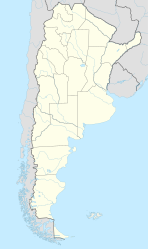Salta City
| Salta | ||
|---|---|---|
| City | ||

(From top to bottom; from left to right) View of the city from top of San Bernardo Hill; Colonial Cabildo; Cathedral of Salta; Ninth of July Plaza and the Victoria Theatre.
|
||
|
||
| Location of Salta in Argentina | ||
| Coordinates: 24°47′S 65°25′W / 24.783°S 65.417°WCoordinates: 24°47′S 65°25′W / 24.783°S 65.417°W | ||
| Country |
|
|
| Province |
|
|
| Department | Capital | |
| Government | ||
| • Mayor | Miguel Angel Isa | |
| Elevation | 1,152 m (3,780 ft) | |
| Population (2010) | ||
| • City | 535,303 | |
| • Metro | 619,000 | |
| Demonym(s) | salteño | |
| Time zone | ART (UTC−3) | |
| CPA base | A4400 | |
| Dialing code | +54 387 | |
| Climate | Cwb | |
| Website | Official website | |
Salta is a city located in the Lerma Valley, at 1,152 metres (3780 feet) above sea level in the northwest part of Argentina. It is also the name for the capital city of Salta Province. Along with its metropolitan area, it has a population of 619,000 inhabitants, which makes it the second most populated city in the northwest of the country.
It is situated in the Lerma Valley, 1,152 metres (3780 feet) above sea level, at the foothills of the Andes mountains.
The weather is warm and dry, with annual averages of 756 mm of rainfall and an average temperature of 16.4 °C (20.4 °C in summer, 10.8 °C in winter). January and February are the months with greatest rainfall. During the spring, Salta is occasionally plagued by severe, week-long dust storms.
Nicknamed Salta la Linda ("Salta the beautiful"), it has become a major tourist destination due to its old, colonial architecture, tourism friendliness, excellent weather and natural scenery of the valleys westward. Attractions in the city proper include the 18th century Cabildo, the neo-classical style Cathedral, and the 9 de julio central square along with San Bernardo hill and its surroundings. The city's museums exhibit a wide range of artifacts and art work from the native civilizations that flourished in the area (Salta is located in the southernmost region of what was the Inca empire, belonging to the Collasuyu, one of the four areas the empire was divided until the Spanish conquest), as well as from the 16th century Spanish conquest and the colonial and post-colonial periods. Salta used to be the starting point of the "Train to the Clouds" (Tren a las nubes), and on the way to red-soiled Cafayate, as well as to other nearby tourist destinations.
The Martín Miguel de Güemes Airport, 6 kilometres southwest of the city, has regular flights to Buenos Aires, Tucumán, Jujuy, Córdoba, Iguazu, Rio de Janeiro and Santa Cruz de la Sierra (Bolivia).
...
Wikipedia


